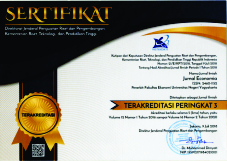Fair Value Accounting and Earnings Management Using LLP and Realized Gains and Losses: Study in Banking Industry Listed on Indonesia Stock Exchange
Downloads
Abstract: Fair Value Accounting and Earnings Management Using LLP and Realized Gains and Losses: Study in Banking Industry Listed on Indonesia Stock Exchange. This study examines whether earnings management can be limited by the implementation of fair value accounting in banking industry. The main contribution of this study is providing provide empirical evidence about the impact of fair value accounting on earnings management in Indonesia. Earnings management is proxied by loan loss provision (LLP), the realized of gains and losses, and the trade-off between realized gains and losses and LLP following Bratten et al (2013). The study provides empirical evidence that earnings management is still performed by banks, by using LLP, realized gains and losses and also occurs trade-off between LLP and realized gains and losses as means to perform earnings management in accordance with the needs of management. If banks are exposed to fair value accounting, managers will have more flexibility in reporting banks' financial performance to present a desired earning, by providing them with additional earning managements tools. These findings can be informative for policymakers, banking practitioners, and academics.
Keywords: earnings management, fair value accounting, LLP, realized gains and losses, trade-off LLP and realized gains and losses.
Abstrak: Akuntansi Nilai Wajar dan Manajemen Laba menggunakan CKPN dan Realized Gains and Losses: Studi pada Industri Perbankan yang terdaftar di Bursa Efek Indonesia. Studi ini bertujuan untuk meneliti apakah manajemen laba dapat dibatasi oleh penerapan akuntansi nilai wajar dalam industri perbankan. Kontribusi dari penelitian ini adalah untuk memberikan bukti empiris tentang dampak penerapan akuntansi nilai wajar pada manajemen laba di Indonesia. Manajemen laba diproksikan oleh cadangan kerugian penurunan nilai (CKPN), realized of gains and losses, dan trade-off antara realized of gains and losses dan CKPN mengikuti model penelitian Bratten et al (2013). Studi ini memberikan bukti empiris bahwa manajemen laba masih dilakukan oleh bank menggunakan CKPN, realized of gains and losses dan juga terjadi trade-off antara CKPN dan realized of gains and losses sebagai sarana manajemen laba sesuai dengan kebutuhan manajemen. Konsekuensi dari paparan bank terhadap akuntansi nilai wajar dapat meningkatkan fleksibilitas manajer dalam melaporkan penghasilan yang diinginkan dengan memberikan mereka alat manajemen laba. Temuan-temuan tersebut dapat bersifat informatif bagi pembuat kebijakan, anggota industri perbankan, dan akademisi.
Kata kunci: manajemen laba, akuntansi nilai wajar, CKPN, realized gains and losses, trade-off CKPN dan realized gains and losses.
Downloads
Ahmed, A. S., Takeda, C., & Thomas, S. (1999). Bank Loan Loss Provisions: A reexamination of Capital Management, Earnings Management and Signaling Effects. Journal of Accounting and Economics,28 (1), 1-25.
Barth, M. E. (2006). Including Estimates of The Future in Today's Financial Statement. Accounting Horizon, 20 (3), 271-285.
Beatty, A., Chamberlain, S. L. & Magliolo, J. (1995). Managing Financial Reports of Commercial Banks: The Influence of Taxes, Regulatory Capital and Earnings. Journal of Accounting Research, 33(2), 231-261.
Beatty, A., & Harris, D. G. (1998). The Effect of Taxes, Agency Costs and Information asymmetry on Earning Management: A Comparison of Public and Private Firms. Review of Accounting Studies, 4(3), 299-326.
Beatty, A., Ke, B., & Petroni, K. R. (2002). Earnings Management to Avoid Earnings Declines Across publicly and Privately Held Banks. The Accounting Review,77 (3), 547-570.
Bank Indonesia. (2012). Bank Indonesia Regulation No.14 / 15 / PBI / 2012 concerning Asset Quality Rating for Commercial Banks. Jakarta.
Bratten, B., Cusholli, M. & Mayers, L. A. (2013). Fair Value Accounting, Auditor Specialization, and Earnings Management: Evidence from the banking Industry. Working Paper, University of Kentucky, KY.
Bushman. R. M., & Williams, C. D. (2012). Accounting discretion, loan loss provisioning, and discipline of banks' risk-taking. Journal of Accounting and Economics, 54(1), 1-18.
Cheng, Q., Warfield, T. & Ye, M..(2011). Equity incentives and earnings management: Evidence from the banking industry. Journal of Accounting, Auditing and Finance, 26(2), 317-349.
Dechow, P. M, and C. Shakespeare. (2009)Do managers time securitization transaction to obtain accounting benefit? The Accounting Review,84 (1), 99-132.
Dechow, P. M., L. A. Myers, and C. Shakespeare. (2010). Fair Value Accounting and Gains From Asset securitizations: A Convenient Earnings Management Tool with Side Compensation Benefits. Journal of Accounting and Economics, 49(1), 2-25.
Ikatan Akuntan Indonesia (IAI). (2015)Standar Akuntansi Keuangan. Jakarta: Ikatan Akuntan Indonesia.
Johnson, S. (2008). The Fair Value Blame Game: Fallout From The Credit Crisis Has Put Mark-to-market accounting to the Test. CFO.com. accessed October 30, 2015.
Kanagaretnam, K., Lobo, G. & Mathieu, R. (2003). Managerial incentives for income smoothing through bank loan loss provisions. Review of Quantitative Finance and Accounting, 20(1), 63-80.
Kanagaretnam, K., Lobo, G. & Yang, D. (2004). Joint tests of signaling and income smoothing through Bank Loan Loss Provisions. Contemporary Accounting Research, 21(4), 843-884.
Khan, U. (2011). Does Fair Value Accounting Contribute to the Systematic Risk in the Banking Industry?. Working Paper, Colombia Business School.
Linsmeier, T. J. (2011). Financial Reporting and Financial Crises: The Case for Measuring Financial Instruments at Fair Value in the Financial Statements. Accounting Horizons, 25( 2), 409-418.
O'Hara, M & Macey, J. R. (2003). The Corporate Governance of Banks. Federal Reserve Banks Policy Review, 9(1),1-17.
Oosterbosch. (2009). Earnings Management in The Banking Industry: The Consequences of IFRS Implementation on Discretionary Use of Loan Loss Provisions. Unpublished Tesis. Eramus University Rotterdam.
Nissim, D. (2003). Reliability of the Bank's Disclosure for Fair Value Loans. Review of Quantitative Finance and Accounting, 20(1), 355-384.
Nissim, D. & Penman, S. (2007). Fair Value Accounting in The Banking Industry. Working Paper. Columbia Business School.
Santy, P., Tawakkal, & Pontoh, G. T. (2012). Pengaruh Adopsi IFRS terhadap Manajemen Laba pada Perusahaan Perbankan di Bursa Efek Indonesia. Indonesian Journal of Accounting Research,1 (3), 1-36.
Supriyatno. (2006). Pengaruh Corporate Governance dan Bentuk Kepemilikan terhadap Kinerja Keuangan Bank di Indonesia Periode 1999-2004. Unpublished Dissertation. Yogyakarta: Gadjah Mada University.
Schipper, K. (1989). Commentary on Earnings Management. Accounting Horizons (December): 91–102.















